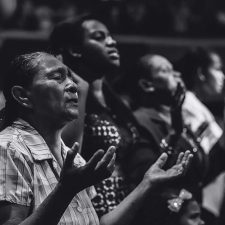Elijah knew the importance of the altar. In 1 Kings 18, he repaired the altar after the prophets of Baal had destroyed it. An altar is a place of sacrifice, worship, and a memorial. It is a designated place to have an encounter with our Savior; a place of exchange. Gripping the edges of the altar in reverence, we see the true nature of sacrifice. Positioned with care, the sacrifice is put to death while the guilty are set free. Blood cleans the ugly stain of sin.
The altar is a place to meet God and offer that which pleases Him, at great cost to the giver. The sacrifice in the Old Testament was tied and ceremonially prepared to spill blood to atone for sin. One had to pay the ultimate price so the other could go free. The offering was surrendered as healthy, full of life. Fire came and consumed the offering in satisfaction. Standing in worship, discovery begins in the fear of the Lord, and the fire from above then burns within our hearts.
Personal Altar
Often, the Israelites built an altar after miracles, as a reminder of God’s faithfulness for those that followed. We must have a personal altar. We must have a place to meet God and to lay all things before Him so nothing is in competition with Him.
There are no shortcuts or gimmicks at the altar; Christ has preeminence. In worship, we offer all of ourselves and He gives us all of himself. As Abraham offered his most precious gift to the Lord, he discovered God’s answer and perfect provision.
The place where we meet God is such a sacred place! In Hebrews 13:10, an exchange of life takes place. At the altar, there is the spilling of blood, a death, a burning and an accepted blessing. In this place of absolute surrender, we enter true understanding. Rhetoric and superficiality is exchanged for experiential power.
Having an inner altar means we take time and surrender those things most precious to us before God. In so doing, we are saying “nothing is in competition with You; You have preeminence, Lord; I am yours and yours alone.” Our worship and prayers and the pouring out of our hearts is like sweet incense to God in Psalms 141:2.
This altar life releases fire and power from above. We learn to trust that His best is far greater than anything we could manufacture or preserve. This is radical but revolutionary! We are casting everything onto the Lord so that we are free to walk in providential liberty. We lay our whole heart and expectation upon the altar at His feet.
The result is a personal understanding of how we are loved by God. We then can love Him with our heart, mind, soul, and strength. Until we do this, we will be double-minded and having one hand on everything rather than being completely surrendered to Him.
Exchanged Life
Without an altar, our problems and difficulties will consume us. The lie of trying to manage our sin or guilt will wear out any saint. God’s provision is His altar where the guilty are made free and the ashes are removed, and beauty is seen. Burdens are released and we can walk in the liberty of the Spirit, as in Galatians 5:1.
In this place of true surrender, there is an unspeakable joy. At the altar, being conquered (or persuaded) is essential to the exchanged life. We let go of our own ways and we cling to the Almighty. We become a living sacrifice—an offering of praise, alive to God (Romans 6:11).
Living from the Altar
Humility, teachability, and willingness are all the results of a surrendered, submitted life that stands in awe of the greatness of God. Awe leads us to focus and come under the authority of truth and we are moved in the Spirit.
As worshipers, we are amazed at who God is. As we move “out of the way,” His beauty begins to shine through our broken vessel. In brokenness, we reveal the true treasure and commune with His perfect life.
Life can be defined sometimes as controlled chaos. It is a myth to think we are in control. We will never understand the destiny of why things can enter our lives until we commit them back to God. We begin to learn to rest in knowing that the consequences are the Lord’s and He knows exactly what we need. With all our knowledge, we can do it our way, but one thing is lacking—the process of being conformed to the image of His dear Son. As we “let go and let God,” trust is born and we hold on to earthly things loosely.
There is pain at the altar. A divine perspective of pain is that it can show us a new destiny. A nailed scarred, pierced Christ, who endured all manner of troubles, wants to carry our pain—for the chastisement of our peace was upon Him (Isaiah 53:5). He is the Man of Sorrows, bearing all our grief so that we are made free. So many live in pain; Jesus comforts all who mourn and unfolds His purpose in the most difficult trials.
Bringing us to new depths with God is the destiny of the altar life.
In 2 Timothy 1:12, we see when something is committed to Him, He becomes the caretaker of it. We give back situations, people and our greatest fears, then we look unto Jesus in worship and He consumes our offering.
A ministry comes from the altar life. As we minister to God, the “fire” or “overflow” goes to others. The apostle Paul declares, “Death worketh in us but life in you.” (2 Corinthians 4:12)
“Then I will go to the altar of God, to God my exceeding joy….” (Psalms 43:3-4 KJV)
Let go of those precious things that detract from the fervent flame and put them into the hands of Jesus. Let Him be the divine caretaker and protector of your soul. We give Him our ashes and He gives us His beauty. Hold nothing back, lay it all down at the altar—true rest is waiting.
“The altar—the lonely place where I lay my burdens down. There, my foolish heart finds sanctuary. Stillness and calm capture my heart as I lay down myself and in death resurrected life begins.”













